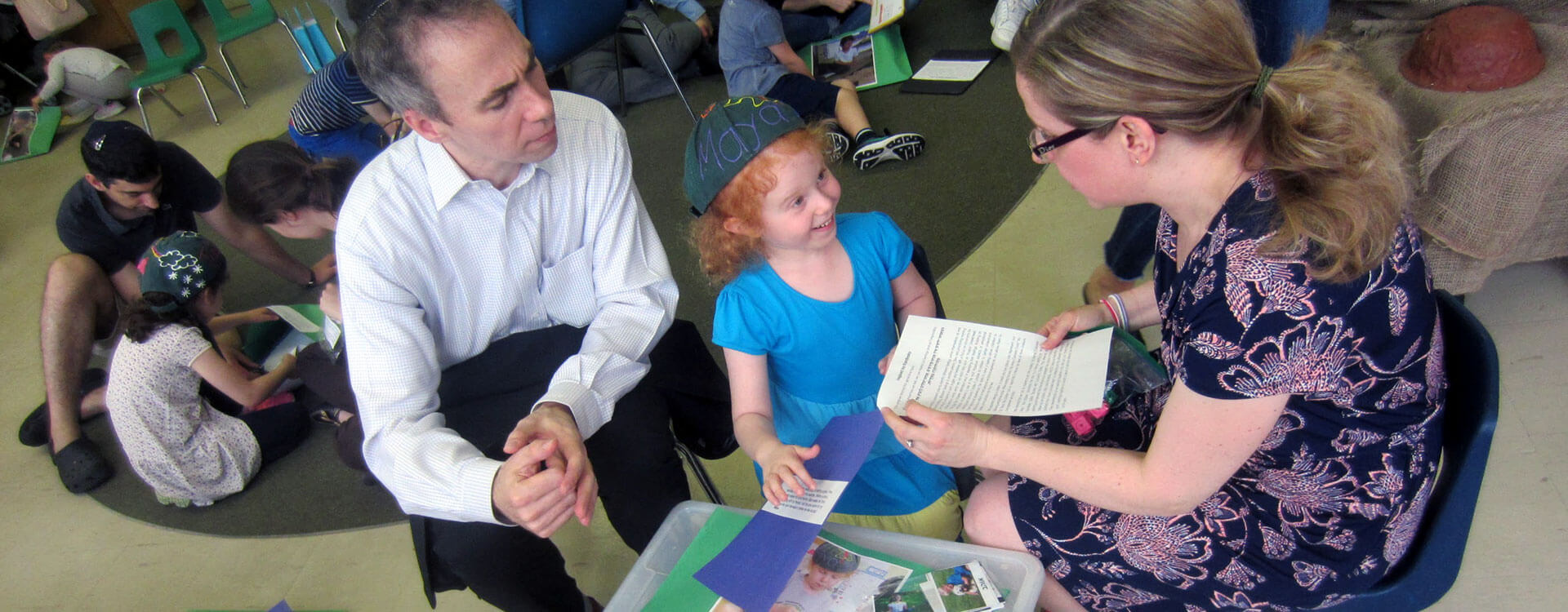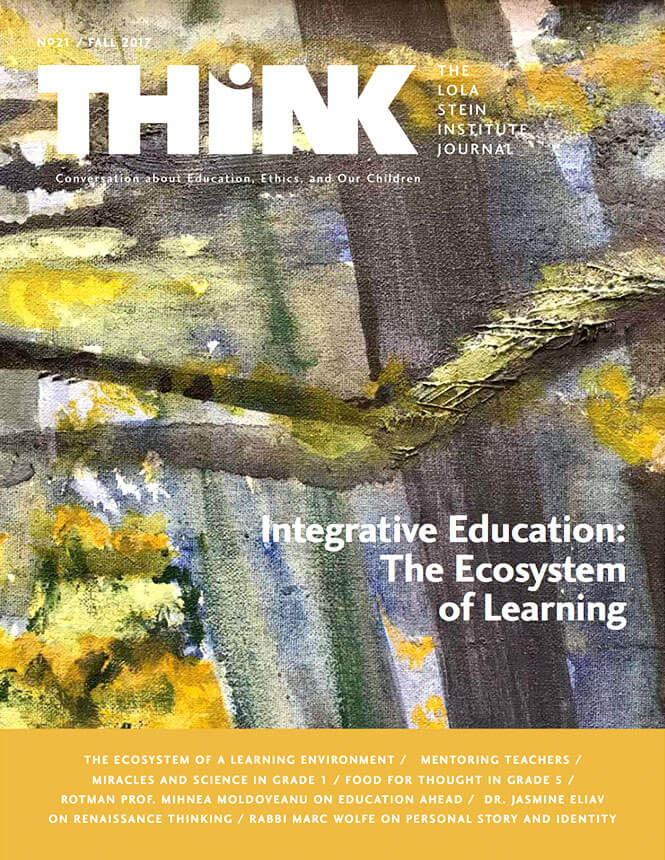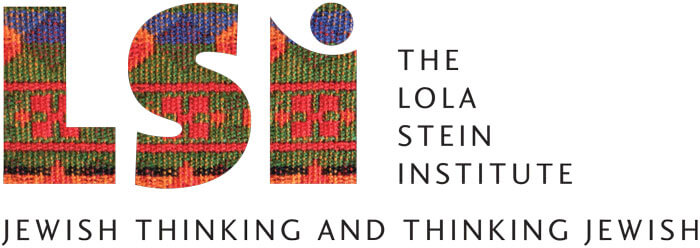- How We Teach

- First Column
- Second Column
- Third Column
- Case Studies

- First Column
- Second Column
- Culture & Community

- First Column
- Second Column
- News & Views

- Admissions

- First Column
- Second Column
- Support Us

- About

- First Column
- Second Column
- Parent Hub
- Attend an Open House
- Take a Tour
- Donate Now
- Calendar
- Blog
- 416-635-1876
- Search
Living the Vision
by

There are many of us working together to bring out the best in our kids. We connect to one another in vision, values, and spirit.
At The Toronto Heschel School’s most recent graduation ceremony, a guest commented on how remarkable it was to see a class of students so obviously connected to one another and to their teachers—and, more so, how unusual to see a group of parents who were so close. Graduation took place on a Thursday in June. The following night, every graduate gathered with his/her parents and siblings for Shabbat dinner. Initiated, organized, and hosted by parents, the dinner exemplifies how a diverse school community can create meaningful bonds between families from a wide range of affiliations, levels of observance, traditions, and family structures.
What unites these families is a shared commitment to raising kind, thoughtful, well-rounded mensches. The shared aspiration is never more evident than at the school’s annual Chanukah Festival of the Arts, which ends—every year— with the singing of Debbie Friedman’s “Oh Hear My Prayer.” The Heschel rendition opens with one or two student soloists, then gradually builds as all students, staff, parents, grandparents, and alumni take turns singing the lyrics:
Oh hear my prayer, I sing to You.
Be gracious to the ones I love.
And bless them with goodness, and mercy and peace.
Oh hear my prayer to You.By the time the entire community is singing together, there are very few dry eyes in the room. As a Heschel parent There are many of us working together to bring out the best in our kids. We connect to one another in vision, values, and spirit. and staff member, I find the singing of “Oh Hear My Prayer” to be so powerful, because it demonstrates that there are many of us working together to bring out the best in our kids. We are connected to one another in vision, values, and spirit.
How do you build a tight-knit school community? The foundation is that these families and staff are attracted to the school because of its particular brand of Jewish education, which is rooted in the teachings of Rabbi Abraham Joshua Heschel. It builds from there.
Rabbi Heschel believed that participation as a citizen of the world is a prerequisite to being a good Jew. Toronto Heschel students learn that doing good deeds begins with small acts of kindness, such as opening doors for each other, wishing friends who are not feeling well a refuah shlemah, being inclusive and caring. There is a “Heschel-ian” way of behaving that begins with the school’s administration and staff and is reciprocated by students and their families.
It is no accident that last year’s graduating families made the effort to celebrate the final Shabbat of the school year together. Inclusivity is key to the school mission; it reflects Rabbi Heschel’s concern for the spiritual quality of human relations and the unity of the Jewish people. The philosophy hinges on religious pluralism and mutual respect and the school carries this forward in all ways. It makes it a priority to welcome new families warmly—not just the new students, but their parents and siblings too. At a welcome dinner in late August, new families meet future teachers, classmates, and parents. Parent ambassadors connect quickly with new families through initiatives that include personal letters and hand-delivered Shabbat packages.
The warm welcome extends through the months that follow. The Chevra Committee is open to all; it is a large group of parents who organize and run school events—from Breakfast in the School Sukkah in the fall, to Havdallah on Ice in winter, to Mitzvah Day in the spring. The programs are spirited, festive, and very popular; they create wonderful opportunities for families to come together and share Jewish traditions and rituals.
The spirit of inclusion extends broadly and serves everyone. Volunteers help with everything from hot lunches to project displays to field trips. Parents with particular skills sets (e.g., landscaping, photography, cooking) find “niche” ways to contribute. The Adult Education program invites parents, grandparents, alumni, and staff to expand their own Jewish learning. Each grade organizes an adult-only class party that is just as well attended by long-time parents as by new parents; it’s a chance to schmooze, catch up with old friends, and get to know new ones. Good news (e.g., births, b’nei mitzvoth) and bad news (e.g., death in a family) are shared across the school community, as are mutual support, celebrations, shiva meals, and baby gifts.
Another pivotal practice is that Heschel parents come into the building every day—at drop-off in the morning and at pick-up in the afternoon. Bringing parents physically into the building melds them into the life of the school: they gain an easy window into what their children are learning, as student work is always on display, whether finished or in progress. It also lets parents and teachers speak together regularly and grow to know one another over the school year.
Rabbi Heschel famously said, “In Selma, I prayed with my feet.” He walked with Martin Luther King Jr. because he believed that Jewish actions have to reflect our beliefs. Each week the school chooses a particular ethical theme from the week’s Torah portion: a Middah Hashavua. Teachers discuss the Middah with students and post it in every room. The theme is communicated to parents and grandparents in the weekly bulletin, with explanations about how it shows up in daily life. Teachers also deliver weekly messages to parents telling them about the Middah Hashavua discussed in class, adding questions to help guide more conversation at home. We foster continual dialogue about ethics and their practice.
Toronto Heschel parents were surveyed this year to discover what they valued most about the school. The two most frequent responses cited the school’s integrated curriculum and its tight-knit community. This twinning is not happenstance. The school has been developed with vision and purpose. Its unique educational philosophy permeates every aspect, from classroom set-up to integrated study units to the inclusive, energetic community culture. It runs through the learning and through the lived relationships of staff, students, and families. At Heschel, we live the vision.
Lisa Richler is the parent of three Toronto Heschel School students. Formerly a teacher and writer, she is now the school’s Director of Communications and Admissions.
NEXT ARTICLE
Coaching the Integrative TeacherSpecial Feature
Satisfaction GuaranteedFood for ThoughtMatter, Metamorphosis, and Miracles in Grade 1The World Is My TeacherIntegrated Learning at The Toronto Heschel SchoolBeyond the BuzzOur Sages Tell Us
The 21st Century Renaissance ThinkerChaos and OrderNarrative and IdentityWho Tells Your Story? Who Tells Ours?Re-Designing Formative Education on the Eve of the Fourth Industrial RevolutionTranscendental LearningColumns
Recommendations for Children and the People Who Love ThemGood Books by Gail BakerAn Ecosystem for Successful LearningSchool of SalmonPerspectives
 The Lola Stein Institute (LSI) is a centre of inventive educational thinking and addresses the challenge to re-frame schooling for the exigencies of our times.
The Lola Stein Institute (LSI) is a centre of inventive educational thinking and addresses the challenge to re-frame schooling for the exigencies of our times.










